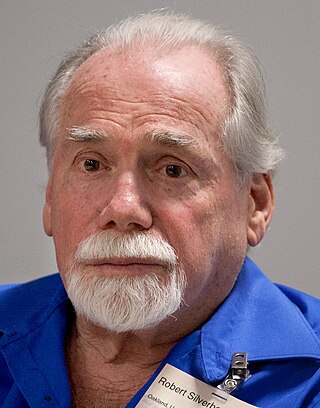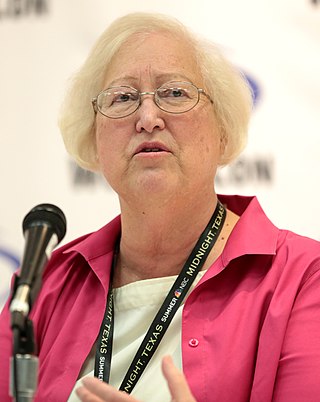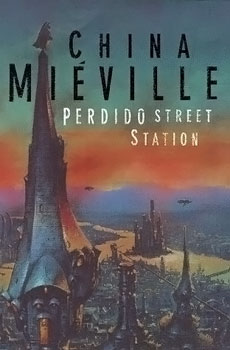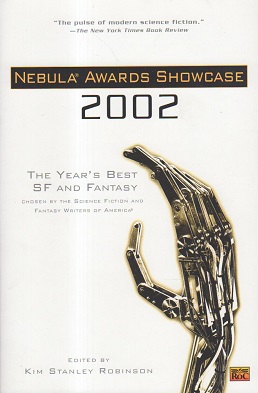
Harold Adrian Russell "Kim" Philby was a British intelligence officer and a double agent for the Soviet Union. In 1963, he was revealed to be a member of the Cambridge Five, a spy ring that had divulged British secrets to the Soviets during World War II and in the early stages of the Cold War. Of the five, Philby is believed to have been the most successful in providing secret information to the Soviets.

Timothy Thomas Powers is an American science fiction and fantasy author. His first major novel was The Drawing of the Dark (1979), but the novel that earned him wide praise was The Anubis Gates (1983), which won the Philip K. Dick Award, and has since been published in many other languages. His other written work include Dinner at Deviant's Palace (1985), Last Call (1992), Expiration Date (1996), Earthquake Weather (1997), Declare (2000), and Three Days to Never (2006). Powers has won the World Fantasy Award twice for his critically acclaimed novels Last Call and Declare. His 1987 novel On Stranger Tides served as inspiration for the Monkey Island franchise of video games and was partly adapted into the fourth Pirates of the Caribbean film.

Gene Rodman Wolfe was an American science fiction and fantasy writer. He was noted for his dense, allusive prose as well as the strong influence of his Catholic faith. He was a prolific short story writer and novelist, and won many literary awards. Wolfe has been called "the Melville of science fiction", and was honored as a Grand Master by the Science Fiction and Fantasy Writers of America.

Robert Silverberg is a prolific American science fiction author and editor. He is a multiple winner of both Hugo and Nebula Awards, a member of the Science Fiction and Fantasy Hall of Fame, and a Grand Master of SF since 2004.

Constance Elaine Trimmer Willis, commonly known as Connie Willis, is an American science fiction and fantasy writer. She has won eleven Hugo Awards and seven Nebula Awards for particular works—more major SF awards than any other writer—most recently the "Best Novel" Hugo and Nebula Awards for Blackout/All Clear (2010). She was inducted by the Science Fiction Hall of Fame in 2009 and the Science Fiction Writers of America named her its 28th SFWA Grand Master in 2011.

John Joseph Vincent Kessel is an American author of science fiction and fantasy. He is a prolific short story writer, and the author of four solo novels, Good News From Outer Space (1989), Corrupting Dr. Nice (1997), The Moon and the Other (2017), and Pride and Prometheus (2018), and one novel, Freedom Beach (1985) in collaboration with his friend James Patrick Kelly. Kessel is married to author Therese Anne Fowler.
The Nebula Award for Best Script was given each year by the Science Fiction and Fantasy Writers Association (SFWA) for science fiction or fantasy scripts for movies or television episodes. Awards are also given out for published literary works in the novel, novella, novelette, and short story categories. The Nebula Award for Best Script was awarded annually from 1974 through 1978, and from 2000 through 2009. It was presented under several names; in 1974, 1975, and 1977 the award was for Best Dramatic Presentation, while in 1976 the award was for Best Dramatic Writing. The award was discontinued in 2010 and replaced with Ray Bradbury Nebula Award for Outstanding Dramatic Presentation; this award was not originally a Nebula but was made one retroactively in 2019, and is presented at the Nebula Awards Ceremony and follows Nebula rules and procedures. The Nebula Awards have been described as one of "the most important of the American science fiction awards" and "the science-fiction and fantasy equivalent" of the Emmy Awards.
Urban fantasy is a subgenre of fantasy, placing supernatural elements in a contemporary urban-affected setting. The combination provides the writer with a platform for classic fantasy tropes, quixotic plot-elements, and unusual characters—without demanding the creation of an entire imaginary world.

Tinker Tailor Soldier Spy is a 1974 spy novel by the author and former spy John le Carré. It follows the endeavours of the taciturn, ageing spymaster George Smiley to uncover a Soviet mole in the British Secret Intelligence Service. The novel has received critical acclaim for its complex social commentary—and, at the time, relevance, following the defection of Kim Philby. It was followed by The Honourable Schoolboy in 1977 and Smiley's People in 1979. The three novels together make up the "Karla Trilogy", named after Smiley's long-time nemesis Karla, the head of Soviet foreign intelligence and the trilogy's overarching antagonist.
Michael Lawson Bishop was an American author. Over five decades and in more than thirty books, he created what has been called a "body of work that stands among the most admired and influential in modern science fiction and fantasy literature."

Perdido Street Station is a novel by British writer China Miéville, published in 2000 by Macmillan. Often described as weird fiction, it is set in a world where both magic and steampunk technology exist. It won the Arthur C. Clarke Award and was ranked by Locus as the 6th all-time best fantasy novel published in the 20th century.

Gilgamesh in the Outback is a science fiction novella by American writer Robert Silverberg, a sequel to his historical novel Gilgamesh the King as well as a story in the shared universe series Heroes in Hell. It won the Hugo Award for Best Novella in 1987 and was also nominated for the Nebula Award for Best Novella in 1986. Originally published in Asimov's Science Fiction, it was then printed in Rebels in Hell before being incorporated into Silverberg's novel To the Land of the Living. Real-life writers Robert E. Howard and H. P. Lovecraft feature as characters in the novella.

Heroes in Hell is an anthology book and the first volume of its namesake series, created by American writer Janet Morris. The book placed eighth in the annual Locus Poll for Best Anthology in 1987. "Newton Sleep" by Gregory Benford, originally published in The Magazine of Fantasy and Science Fiction, received a Nebula Award nomination in 1986, as well as placing 16th in its category in the Locus Poll.

Ancillary Justice is a science fiction novel by the American writer Ann Leckie, published in 2013. It is Leckie's debut novel and the first in her Imperial Radch space opera trilogy, followed by Ancillary Sword (2014) and Ancillary Mercy (2015). The novel follows Breq—who is both the sole survivor of a starship destroyed by treachery and the vessel of that ship's artificial consciousness—as she seeks revenge against the ruler of her civilization.

Nebula Awards Showcase 2002 is an anthology of award-winning science fiction short works edited by Kim Stanley Robinson. It was first published in trade paperback by Roc/New American Library in April 2002.

Sam J. Miller is an American science fiction, fantasy and horror short fiction author. His stories have appeared in publications such as Clarkesworld, Asimov's Science Fiction, and Lightspeed, along with over 15 "year's best" story collections. He was finalist for multiple Nebula Awards along with the World Fantasy and Theodore Sturgeon Awards. He won the 2013 Shirley Jackson Award for his short story "57 Reasons for the Slate Quarry Suicides." His debut novel, The Art of Starving, was published in 2017 and his novel Blackfish City won the 2019 John W. Campbell Memorial Award.

Trail of Lightning is a 2018 fantasy novel, the debut novel by Rebecca Roanhorse. After a supernatural disaster destroys most of North America, Navajo monster-slayer Maggie Hoskie must navigate a world of monsters and gods. The novel won the 2019 Locus Award for Best First Novel and was nominated for the Hugo, World Fantasy, and Nebula awards.
Dexter Gabriel, better known by his pen name Phenderson Djèlí Clark, is an American speculative fiction writer and historian, who is an assistant professor in the department of history at the University of Connecticut. He uses a pen name to differentiate his literary work from his academic work, and has also published under the name A. Phenderson Clark. This pen name, "Djèlí", makes reference to the griots – traditional Western African storytellers, historians and poets.
The Haunting of Tram Car 015 is an alternate history science fantasy police procedural novella by American novelist P. Djèlí Clark. It was first published by Tor.com in 2019.

John Wiswell is an American science fiction and fantasy author whose short fiction has won the Locus and Nebula Awards and been a finalist for the Hugo, British Fantasy, and World Fantasy Awards. His debut fantasy novel, Someone You Can Build a Nest In, was released in April 2024 by DAW Books and Quercus.















